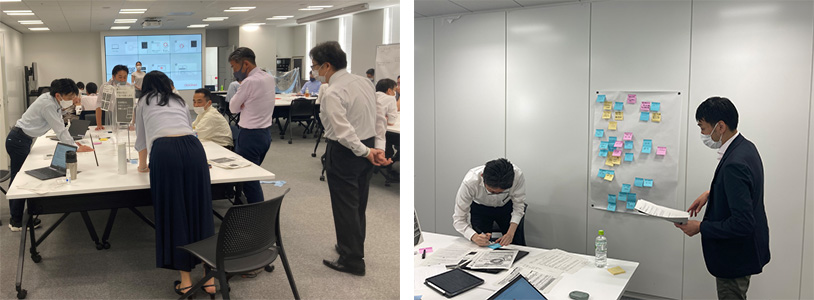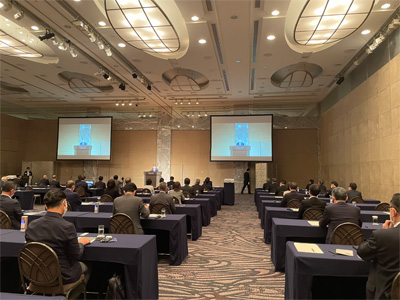Based on the Group's mission statement of "We shall strive to create beautiful living environments, in which each person can pursue individual happiness in a harmonious society," and in accordance with the Tokyu Group Compliance Guidelines, the Code of Conduct, and the Ten Principles of the United Nations Global Compact in the four areas of human rights, labor, environment, and anti-corruption, Tokyu Corporation has promoted efforts to respect human rights. In March 2018, we identified six material sustainability themes (Materiality) as social issues to be addressed, and under the themes of HR Development and Corporate Governance and Compliance, we are working on "achievement of human rights" as one of the social issues to face.
With the adoption of the United Nations Guiding Principles on Business and Human Rights in 2011, and the formulation of the Japan's National Action Plan on Business and Human Rights in 2020, the importance of corporate efforts to address human rights is further increasing. In order to fulfill our corporate social responsibility as stated in the Group philosophy, our company and consolidated subsidiaries have formulated a "Human Rights Policy" as a commitment to fulfilling our responsibility to respect human rights. The policy has been discussed and approved by the Management Meeting, approved by the Board of Directors, and signed by the President.
The Group will continue its efforts to realize a sustainable society and enhance its corporate value by respecting human rights in accordance with the policy.
*The Company and its consolidated subsidiaries have formulated a human rights policy based on the Guiding Principles on Business and Human Rights adopted by the United Nations Human Rights Council.
The Company and its consolidated subsidiaries have adopted the Tokyu Group slogan, "Toward a Beautiful Age - Tokyu Group," as the universal value standard and "We shall strive to create beautiful living environments in which each person can pursue individual happiness in a harmonious society" as the mission statement. We understand that the human rights of all people affected by our business activities must be respected in order to truly contribute to the realization of a sustainable society. As a guideline for fulfilling this responsibility, we hereby formulate the "Human Rights Policy" (hereinafter referred to as the "Policy") and promote our efforts to respect human rights.
* Includes support and respect for the core labour principles: abolition of child labor, elimination of forced or compulsory labor, elimination of discrimination (race, religion, gender, age, sexual orientation, disability, nationality, etc.), and freedom of association and the effective recognition of the right to collective bargaining.
June 29, 2023, Revised
November 1, 2022, Established
Tokyu Corporation
President & Representative Director

Tokyu Group Compliance Guidelines
Signing the United Nations Global Compact
| Person in Charge | Hamana Setsu (Senior Managing Executive Officer) (Hamana Setu) |
|---|---|
| Division Responsible for Promotion | ESG Promotion Group , Corporate Planning Division |
Our company positions the Board of Directors as the highest body for management and supervision, and important matters related to sustainability, including human rights, are resolved and supervised by the Board of Directors. In addition, to proactively promote sustainability initiatives, we are taking all-round initiatives, such as holding Sustainability Promotion Committee (chairman: President), spreading awareness among consolidated companies, and carrying out various educational activities. Please refer below for our sustainability promotion structure.
Sustainability Policy and Promotion System
the Company and its consolidated subsidiaries began conducting human rights risk assessments in fiscal year 2022. We will identify potential adverse impacts on human rights (human rights risks*) that may occur in our business and its supply chain in five business areas: transportation, real estate, life service, hotel and resort, and hospitals, and analyze and evaluate their impact and severity.
In conducting the analysis and evaluation, we engaged external experts to grasp the overall picture of human rights risks (potential and actual) in the Company and its consolidated subsidiaries business from the risks identified by international organizations and NGOs, examples of actual risks within the industry, and interviews with relevant departments (major affiliated companies) of our company with regard to human rights in the supply chain for the businesses of our company and its consolidated subsidiaries. We then conducted screening to identify and evaluate the particularly significant risks from the perspectives of "severity" and "likelihood" as follows.
*Risks related to workforce issues, safety and health in each business are included.

The 10 significant human rights risks that have been identified as important risks that should be considered by the Company and its consolidated subsidiaries are as shown in the table below.
The top priority risks are “Serious forced labor, slave labor and child labor involving employees of domestic and foreign suppliers” and “Health and safety violations of the company or its tenants’ products and services against consumers” in all businesses, “Lack of safety and health and serious forced labor, slave labor and child labor within subcontracting construction companies, etc.” in the Real Estate Business and “Indirect involvement in human trafficking, etc.” in the Hotel and Resort Business. The other risks identified as especially significant ones to be considered are “Discrimination against customers (consumers) when service is provided” in all businesses except the Hospital business, “Leakage of personal information resulted in the invasion of privacy” in the Real Estate, Life Service, and Hospital businesses, and “Workplace bullying between employees, occupational health and safety violations, long working hours, nonpayment of wages, etc.” related to the employees of the Company and its consolidated subsidiaries.
| Target of human rights violations | Human rights risks | Prime associated business domain | |||||||
|---|---|---|---|---|---|---|---|---|---|
| Transportation | Real estate | Life service |
Hotel Resort |
Hospital | • Preventive and corrective response policies...■ •Initiatives for 2024...✓ |
||||
| Top priority | Employees of raw materials
and other suppliers |
① Serious forms of forced/slave/child labor | ● | ● | ● | ● | ● |
|
|
| Employees of outsourcing businesses, etc. | ② Inadequate health or safety, serious forms of forced/slave/ child labor, in subcontractor construction firms, etc. | ● | |||||||
| Customers/ Consumers | ③ Health or safety violations | Health or safety violations owing to defective in-house products, services, etc. | ● | ● | ● | ● | ● |
|
|
| Health or safety violations owing to defective tenant products, services, etc. | ● | ● | ● | ● | ● |
|
|||
| ④ Indirect complicity in human trafficking, etc. | ● |
|
|||||||
| priority | Consolidated employees | ⑤ Workplace harassment among employees | ● | ● | ● | ● | ● |
|
|
| ⑥ Inadequate health or safety in work environments | ● | ● | ● | ● | ● | ||||
| ⑦ Prolonged or excessive labor | ● | ● | ● | ● | ● | ||||
| ⑧ Inadequate or unpaid wages | ● | ● | ● | ● | ● | ||||
| Customers/ Consumers | ⑨ Discrimination against customers (consumers) in provision of our services | ● | ● | ● | ● | ● |
|
||
| ⑩ Privacy violations caused by leaks of personal information | Privacy violations on our part | ● | ● | ● | ● | ● |
|
||
| Privacy violations by tenants | ● | ● | ● | ● | ● |
|
|||
*● in the "Relevant business area" column indicates that particular attention should be paid to the business area. Attention should be also paid to the business areas without ●.
*The criteria for severity are the severity and scope, etc. of the damage caused by an incident. The criteria for likelihood are latent factors (including materialized risks in the industry and internal interviews) and actual factors (including troubles or concerns confirmed by internal interviews etc.)
In human rights due diligence, we will inform the business partners of the Company and its consolidated subsidiaries of our policies and identify and investigate any potential risks through surveys and interviews. Subsequently, we will disclose the results and work towards making necessary improvements. In this way, we will enhance our human rights due diligence.
We will pursue business dealings with business partners who can comply with the above human rights policy and who will work with us to fulfill the responsibilities that society expects of companies. In addition, we will regularly check the status of compliance with the procurement policy that reflects our human rights policy on the part of business partners who regularly do business with us, and call on those business partners to make improvements as necessary.
In March 2024, we held a dialogue with external experts regarding our human rights and sustainable supply chain management initiatives.
For more details, please see the following page.
In formulating Human Rights Policy Human Rights Policy, we held training and workshops for division Manager to promote internal understanding and gather opinions. We received cooperation from the Caux Round Table Japan, a non-profit organization, who gave a lecture to deepen understanding of "business and human rights," including the "Guiding Principles on Business and Human Rights." We also held a workshop where participants considered and discussed Human Rights Policy should have. The content of the discussions held by the participants in this workshop will be used in formulating Human Rights Policy.

Scenes from the workshop
We provide education and training on human rights to new recruits in an effort to promote understanding.
Career support and human resource development
In July 2022, we held a sustainability seminar to raise awareness of business and human rights for our full-time officers and representative directors of our consolidated subsidiaries, named "Business and Human Rights: What we should do in pursuit of new corporate values."
We invited a lecturer from Caux Round Table Japan, a registered NPO, to lead the seminar, during which participants learned about the essential actions the Group shold take with regards to business and human rights. During the lecture, we received insight on what should remain steadfast and what must be changed based on world trends, such as the UN Guiding Principles on Business and Human Rights as well as our Group philosophy and the Company's DNA.

Scenes from the seminar
In addition to the internal whistle-blowing desk, we have a lawyers’ office for our own employees and those of our subsidiaries (including suppliers) to report to and consult. In addition, the Tokyu Corporation Customer Service Center responds to customer comments and inquiries.
In addition, the Tokyu Corporation Customer Service Center responds to customer comments and inquiries.
Internal whistle-blowing system to address compliance issues
Tokyu and its consolidated subsidiaries have established Human Rights Policy to respect the human rights of all people affected by business activities. We believe that respecting human rights also requires that employees who provide services and products to customers are healthy both physically and mentally, and that we provide a workplace environment where they can work with peace of mind.
Furthermore, in accordance with the "Tokyu Group Compliance Guidelines" and "Code of Conduct," we strive to provide services that are considerate of our customers and other related parties and that meet their trust and expectations, but sometimes some customers make intimidating, psychologically or restrictive remarks and actions, make excessive demands that go beyond the bounds of social common sense, and engage in sexual harassment. To ensure that employees can maintain and improve the services they provide to customers with peace of mind, we have established a "Policy on Customer Harassment" and have positioned it as a common policy.